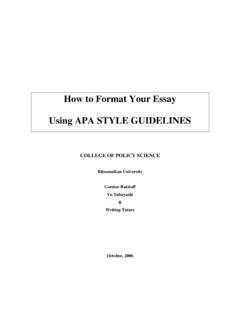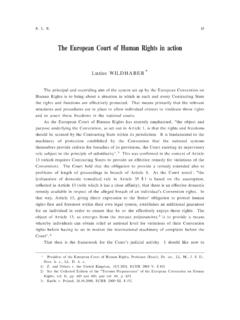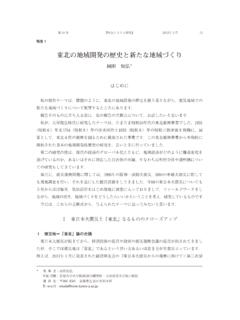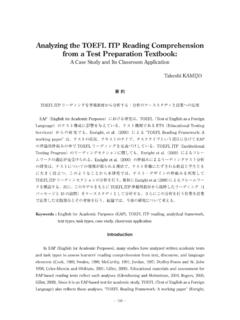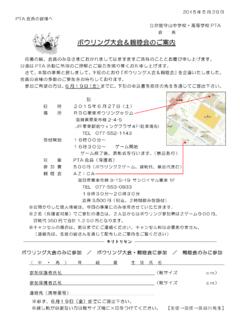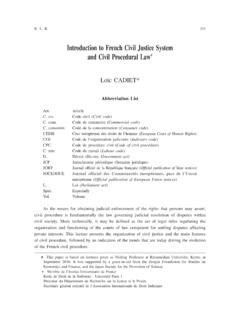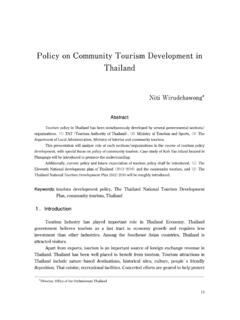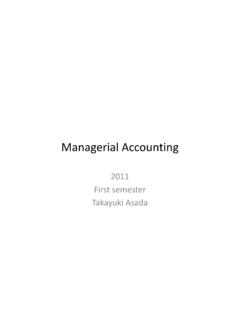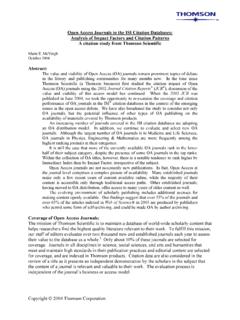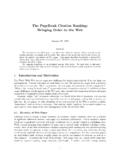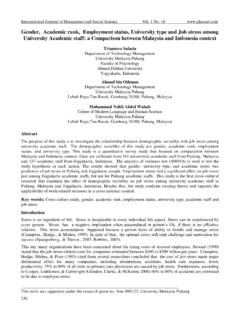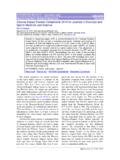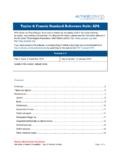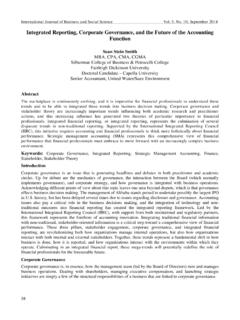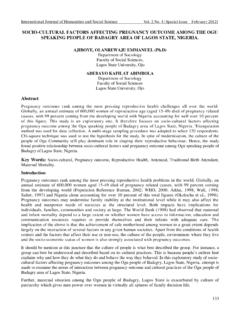Transcription of A Ranking of Journals in Economics and Related Fields
1 A Ranking of Journals inEconomics and Related FieldsKlaus RitzbergerVienna Graduate School of Finance and Institute for Advanced paper presents an update of the Ranking of Economics Journals bythe invariant method, as introduced by Palacio-Huerta and Volij, with a broadersample of Journals . By comparison with the two other most prominent rankings, italso proposes a list of target Journals , ranked according to their quality, as astandard for the field of classification:A12, : journal Ranking ; Economics Journals ; business administrationjournals; finance Journals , INTRODUCTIONThe Ranking of professional Journals in Economics has attracted growinginterest during the past decade (see Kalaitzidakiset al., 2003; Ko czy andStrobel, 2007; Kodrzycki and Yu, 2006; Laband and Piette, 1994; Liebowitzand Palmer, 1984; Liner and Amin, 2006; Palacio-Huerta and Volij, 2004).
2 journal rankings have been used to evaluate the research performance ofeconomics departments ( Bommer and Ursprung, 1998; Combes andLinnemer, 2003; Lubranoet al., 2003) and of individual economists ( , 2003). They provide objective information about the quality ofpublications in a world where academic publications have reached anoverwhelming extent and variety. While half a century ago a well-trainedeconomist may have comprehended all key developments in Economics atlarge, today it is difficult to follow even the pace of subfields. Thus, thejudgment by an individual academic is accurate only in so far as it concernsher or his own field of specialization. Still, hiring, tenure, promotion andfunding decisions should ideally be based on judgments of scientific quality,even when expertise about the specializations of all candidates is that reason economists have turned to journal rankings as a substitute fora direct judgment of scientific quality of individuals and The AuthorJournal CompilationrVerein fu r Socialpolitik and Blackwell Publishing Ltd.
3 2008, 9600 Garsington Road,Oxford OX4 2DQ, UK and 350 Main Street, Malden, MA 02148, economic Review9(4): 402 430 This comes with virtues and vices. An advantage is certainly thatsomething as elusive as scientific quality is not left any more to hearsayand rumors. Rankings also constrain the verdicts by influential scientists,who are sometimes subject to perverse incentives. By this token they fosterthe development of a scientific standard and provide a rough indicator ofscientific quality for politics, administration and the general for the scientific community, rankings can correct misperceptions, bothwith respect to journal quality and the importance of Fields . Narrow fielddefinitions are sometimes used to insulate against judgments of scientificquality. By defining my field as papers written by myself I can ensure to beon top of my field.
4 But rankings reveal how important my field is comparedwith others, provided the sample is large enough. An advantage of theranking presented in this paper is that it covers a broad range of Journals and,thereby, sheds light on how important the different Fields importantly, rankings provide objective information on journalquality. This puts into perspective judgments of journal quality that aregoverned by the abilities, preferences and publications of of such ratings abound. Take, for instance, the journal Rating thatthe Vienna University of Economics and Business Administration1had inplace until the end of 2007. It putsEconometrica the number 1 journal in thecurrent Ranking into the same basket (called A ) as theJournal of MarketingResearch(number 43 in the current Ranking ),Administrative Science Quarterly(number 73 in the current Ranking ),Regional Science and Urban Economics (number 84 in the current Ranking ) orRegional Studies(number 151 in thecurrent Ranking ).
5 And it puts theJournal of economic Theory a top-ten journalin all of the three objective rankings used here into the same basket (calledA) as the local Austrian periodicalEmpirica. According to hearsay this list wasput together by asking incumbent personnel for course, there are better lists than this one. But not even the listpublished by the Kiel Institute for the World Economy2is free of obscurities:They list theJournal of economic Theoryin rank C together with Journals liketheEnergy journal (number 97 in the present Ranking ), theJournal of RegulatoryEconomics(number 108 in the current Ranking ) or theSouthern EconomicJournal(number 173 in the present Ranking ). This is probably an effect ofdouble-counting, as this list was put together by averaging across the rankingsby Kodrzycki and Yu (2006) for which the policy Ranking is a subset of thesocial science Ranking .
6 The Tinbergen list3makes more sense. But it still putstheInternational economic Review(number 5 in the present Ranking ) and theJournal of Monetary Economics (number 7 in the current Ranking ) into the samebracket (A) as theJournal of Environmental Economics and Management(number54 in the present Ranking ) and theJournal of Urban Economics (number 64 in1. See See See of Journalsr2008 The AuthorJournal CompilationrVerein fu r Socialpolitik and Blackwell Publishing Ltd. 2008403the current Ranking ); and it putsEconomic Theory(number 23 in the presentranking), theJournal of Financial and Quantitative Analysis(number 31) andtheJournal of economic Dynamics and Control(number 35) into the samebasket (B) as theInternational journal of Industrial Organization(number 90),theJournal of Evolutionary Economics (number 114) and theEconomics ofEducation Review(number 120).
7 4 Such judgments may reflect subjectiveopinions or policy goals. But those should be made explicit and contrastedwith objective the other hand, objective rankings are no substitute for reading thepapers. Given the high variance of quality within any given journal , where apaper gets published is a very imperfect proxy for its quality. Moreover, manyof the decisions that are aided by rankings need to take into account otherdimensions than where an author has published. How a candidate s specializa-tion fits into a department and the effect on the age structure are at least asimportant considerations for hiring and promotion decisions. Furthermore, itmay often be preferable to hire a candidate who is willing and able to take onhard challenges instead of one who rides on a fashion wave, even though thelatter may have a better publication record.
8 Likewise, funding decisionsshould be guided by a vision about scientific development, rather than bypast successes. On none of these considerations do rankings provide a are based on the idea that one paper quotes another, because theformer uses a result obtained in the latter. Therefore, citation analysis shouldprovide an objective image of quality. This is not always the case, however,for the following (at least) ten , the most important contributions are often not quoted, but usedwithout reference: few papers that use Nash equilibrium cite Nash (1950),among the many papers on continuum economies, a minority quotesAumann (1964), and almost nobody acknowledges Hurwicz (1973) whenworking on mechanism design. Second, and Related , the papers that getquoted most frequently are often not the ones that contain the deepestresults.
9 Deep results are often hard to understand and, therefore, do notattract a large readership. Hence, even though they may ultimately be mostimportant for scientific progress, they do not collect many citations. Third,new developments in sciences often appear in new Journals . But for a newjournal to be included in the citation index takes ages and is subject topolitical manipulation. A prime example is theJournal of the EuropeanEconomic Association, which is still not included in the SSCI, even though ithas certainly published high-quality papers ever since its inception. Fourth,some of the Journals that fare very well in the rankings only do so because asmall handful of articles from these Journals get quoted excessively and theothers not at all. The average paper from such a journal may in fact be quite4.
10 How this list was compiled is not quite clear. On the webpage it is claimed that importantinputs were Kalaitzidakiset al. (2003) and Kodrzycki and Yu (2006). The webpage remainssilent on how these inputs were Ritzbergerr2008 The Author404 journal CompilationrVerein fu r Socialpolitik and Blackwell Publishing Ltd. 2008bad quality, but the few seminal contributions secure a high Ranking . That is, journal rankings give no information about the variance among , there are several aspects of insider outsider problems thataffect rankings. Fifth, there clearly exist citation and refereeing cartels (seePieters and Baumgartner, 2002), often supported by editorial board repre-sentation, that are upheld intentionally to defend the research agenda ofinsiders and restrain , the peer review system of Journals isbiased against authors that are not affiliated with top universities or areemployed at non-academic institutions (see Blank, 1991).
